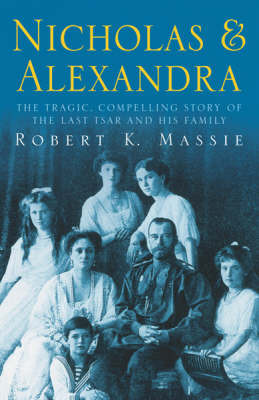
Antonia Fraser, Marie Antoinette: The Journey (2002).
Myths and misconceptions abound about France's tragic eighteenth century queen, destined to lose her ill-fated life in the brutality of the French Revolution. A biography of Marie Antoinette, fair in its treatment, has been long overdue. Fraser's biography of the queen is stylish, beautifully written, evocative, and compelling. In fact, so successful was it that it inspired Sofia Coppola's 2006 film adaptation starring Kirsten Dunst.

Robert K. Massie, Nicholas & Alexandra (1967).
It may have been published in 1967, but Robert K. Massie's study of the last tsar of Russia, Nicholas II, and his unpopular consort Alexandra remains the definitive biography of the Imperial family. The book is particularly moving when readers learn early on that the author was inspired to write this book because of his son's own haemophilia, shared by the Tsar's son and heir Alexis. The Russian royal family fought to conceal this humiliating and disturbing truth from their subjects, but to no avail. Rasputin's subsequent influence and growing power ruined any hopes of a peaceful succession, and set in train the awful events which led, eventually, to the massacre at Ekaterinburg in 1917.

Oscar Wilde, The Picture of Dorian Gray (1890).
Probably Wilde's most famous work, this dark, captivating and brilliant novel encompasses disturbing themes regarding art, morality, sexuality, murder and, of course, beauty. Although his narcissism, selfishness and cruelty contribute to his spectacular downfall, readers sympathise with Dorian's plight. It's worth considering whether his hedonism and narcissism merely reflect the preoccupations and conceited desires of his own age, rather than symbolise in a more narrow sense his own personal faults and failings.

George Orwell, 1984 (1949).
Need I say more? Disturbing and reflective of the totalitarian systems operating in his own age in he aftermath of the Second World War, Orwell's novel remains a classic example of dystopian oppression.

Philippa Gregory, The Lady of the Rivers (2011.
Following on from the success of her The White Queen, Philippa Gregory tackled Elizabeth Woodville's shadowy mother, Jacquetta of Luxembourg, in The Lady of the Rivers. Beautifully evoking the factional disputes, prevalent misogyny, and sexual politics of fifteenth-century Europe, Jacquetta proves a strong, determined narrator who takes affairs into her own hands and, after an unsuccessful first marriage, marries for love into the Woodville family and guides her daughter's path to the throne of England. The emphasis on witchcraft and magic might prove a little repetitive, but this novel is probably Gregory's best.

Anna Whitelock, Elizabeth's Bedfellows (2013).
This isn't a traditional biography of the Virgin Queen, which is exactly what makes it refreshing. Beautifully written, Anna Whitelock's impressive scholarly pedigree shines through as she guides us through the intimacy of the Elizabethan court. Themes of beauty, fertility, sexuality, marriage, youth, and age are very much to the forefront here; alongside broader issues of representation and image. A must read for all those interested in Elizabeth.
No comments:
Post a Comment